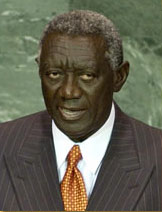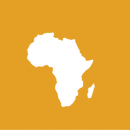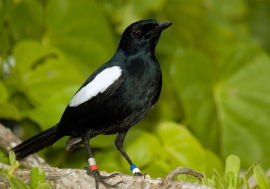Translate words into action, Africans demand
Translate words into action, Africans demand
Africa speaks
More than any other recent year, 2005 has seen Africa emerge as a prominent topic on the international agenda. From the UN Millennium Task Force’s January report on the steps needed to achieve the Millennium Development Goals (MDGs), to the March report of the UK’s Commission on Africa, to the July summits of the African Union (AU) in Libya and the Group of Eight (G-8) industrialized countries in Gleneagles, Scotland, to the 2005 World Summit in New York in September, the continent’s challenges, needs and aspirations have received unprecedented attention. Yet the particular views and expectations of Africans have received less exposure than the numerous promises of the presidents and prime ministers of the developed world. Here we present selected excerpts from some of the African perspectives.
Alpha Oumar Konaré, chairperson, African Union Commission, AU summit, Sirte, Libya, 4 July
A wind of commitment for Africa is blowing over the world which is not simply due to the latest fashion or pretence. It is the expression of a new conscience of solidarity towards Africa and the affirmation of new ethics in cooperation. Our sincere gratitude goes to all those throughout the world today who have Africa’s interest at heart and intend to support African policies, artists, athletes, businessmen and -women, media practitioners and civil society organizations.
 John Kufuor, president of Ghana: “This is the moment to strengthen UN institutions.”
John Kufuor, president of Ghana: “This is the moment to strengthen UN institutions.”Too many promises have been made to us at too many major meetings, but they have not always been kept....
At the present rate, the Millennium Development Goals to be attained by 2015 will not be achieved before a century, if at all. However, let us welcome today’s promises with more vigilance as partners, as a responsible Africa in the spirit of NEPAD [New Partnership for Africa’s Development].
Total cancellation of the debt of 14 ... African countries ... is an important step.... We must ensure that the effects of this initiative are not undermined by conditionalities.
We must also ensure, in our opinion, that collectively the principle of debt reduction for all African countries is firmly laid down, since it is all African countries that are crushed, under similar conditions, by this debt. Releasing the countries known as “the poorest,” without the others, does not release the continent’s energy because the driving force of others is blocked....
Today, Africa needs massive funding for which neither total debt cancellation, nor doubling official development assistance, or even a combination of the two, will suffice.... We need other resources, and to this end, we must address the issue of adequate remuneration for our raw materials, and indeed the guaranteeing of resources from our raw materials.
The issue of subsidies should be appropriately and urgently addressed, and the opening up of the global agricultural market is a political as well as moral requirement. In this battle, we should all stand firmly behind the cotton-producing countries which, in their struggle, have succeeded in making cotton the symbol of the inequalities of the world trade system.
Olusegun Obasanjo, president of Nigeria, AU summit, 5 July
We are fully aware of the extensive media coverage Africa is receiving in G-8 countries and welcome the intimations of further commitments to cancel debt for more African countries and the doubling of aid to Africa. We must now see words or commitments translated into action in support of poverty alleviation.
We too are committed to strengthening our own capabilities to review the effectiveness and progress of these initiatives. A further priority as we stabilize our governance through the African Peer Review Mechanism must be to encourage international support and commitments to strengthen the African Union’s peace and security capabilities.
Tajudeen Abdul-Rahman, general secretary, Pan African Movement, Kampala, Uganda, 7 July
It is difficult to know how to react to this sudden show of concern for a people that have been so marginalized and humiliated for such a long time. It is like being offered a handkerchief by the same person who is beating the hell out of you.... The whole world is now programmed to look up to eight white men in dark suits meeting in faraway Gleneagles, Scotland, to save Africa. None of them is an African.
Yet a much bigger assembly of another powerful group of people, all of them heads of state from across Africa, were meeting in the Libyan city of Sirte deciding on the future of Africa, without a similar focus in the global media....
Significantly, the AU summit did not dwell so much on aid but rather called for the abolition of unfair trading rules that rig international trade against Africa and asked for a clear timetable for the abolition of these subsidies. One can see that African leaders are not taken in by various pledges on aid and rather want us to trade our way to prosperity instead of being aided to remain dependent.
Bamanga Tukur, president, African Business Roundtable, and chairman, NEPAD Business Group, July 2005
2005 looks like being a watershed year for Africa, with unprecedented commitments to cancel debt and increase aid. However, without a commitment to dismantle trade subsidies and market-access barriers in industrialized countries, this historic opportunity risks being squandered. Without more commitment to free trade from the G-8 and industrialized nations, Africans will continue to be denied the opportunity to trade their way out of poverty.
Annan: ‘Grasp the opportunity’ for Africa
The past year has brought an “unprecedented mobilization of international public opinion in support of Africa,” notes UN Secretary-General Kofi Annan. “The central challenge is to grasp the opportunity and maintain the momentum.”
In two reports to the General Assembly, Mr. Annan outlines Africa’s key achievements over the past year, including progress in reducing armed conflicts and further steps towards implementing the New Partnership for Africa’s Development (NEPAD), the African Union’s development plan.
When the Secretary-General in 1998 issued his landmark report on the causes of conflict in Africa, 14 African countries were afflicted by war. Since then, he reports, the number has declined significantly and today “only three African countries are engaged in major conflict” — Côte d’Ivoire, the Democratic Republic of the Congo and Sudan. However, these three conflicts “have resulted in great and horrific loss of life, brutality and human dislocation,” while a number of other countries are experiencing civil strife of lower intensity.
While the UN is fielding a number of major peacekeeping operations in the continent, Africa is enhancing its own capacity to prevent, mediate and resolve conflicts, such as by establishing the African Union’s Peace and Security Council in 2004.
On the economic and social fronts, African countries are developing concrete projects to advance NEPAD’s vision. These projects include building a West African gas pipeline, increasing agricultural productivity, introducing more computers and other technologies into schools and stepping up actions to combat HIV/AIDS.
Donors and creditors have agreed to increase aid and debt relief for a number of African countries, but those initiatives need to be expanded — and accompanied by action to improve Africa’s trade prospects.
Mr. Annan urges Africa’s international partners to honour the commitments they have made. “Slow or delayed redemption of pledges can hinder the pace of implementation, distort priorities of partner countries and lead to loss of faith in international support.”
John Moru, ActionAid International-Nigeria, opinion article in This Day, Lagos, Nigeria, 17 August
There are some worries for us to consider in our quest to make Nigeria different from the past. First is the fact that ... since the announcement of the debt relief for Nigeria, there has not been a comprehensive analysis of the implications of the package for Nigeria in real terms. For instance, what is the role of the international financial institutions — the World Bank and the International Monetary Fund (IMF) — in the negotiations that would take about six months? What do we understand by the Policy Support Instrument by which Nigeria must be guided in order to meet the criteria for debt relief?
Second is the lack of a national framework of action that would clearly stipulate in unambiguous terms where such monies if eventually freed by the Paris Club would go to.... However, the debt relief package to be negotiated for Nigeria is one veritable ground for civil society and grassroots movements to seize the moment and contribute to social change in Nigeria once more. The strategy to be utilized is ... [to] constitute an independent body for the monitoring of monies freed by the Paris Club to boost both the social and productive sectors of the economy.
Gregory Chikwanka, assistant coordinator, Civil Society for Poverty Reduction, Zambia, 31 August
Developed nations should take a leading role in trade issues, because there is a consensus that only trade will help poor countries to develop and attain the Millennium Development Goals. There is need to promote good policies that will open more markets. Issues of tariff escalation, where there is a difference between raw and processed copper, to help promote industries should be addressed. It is difficult to increase industries with a limited market....
There is this tendency where developed countries reduce aid after debt cancellation. This should be discouraged. As more markets are being opened, aid should also be encouraged. 2015 is not far from 2005 and it would be a shame for Zambia if no impact is made on the poverty situation, let alone reverse the social indicators....
As multilateral institutions meet to review the decision by the G-8 countries, they should not place stringent conditionalities. There is enough evidence that Zambia had difficulties meeting the previous conditions tied to aid and debt cancellation, and if we will be given the same conditions ... we stand to lose out.
Yoweri Museveni, president of Uganda, World Summit, 14 September
While Africa’s historical economic role as a supplier of raw materials to the world may have contributed to her economic growth in the past, it is now clear that that role has left Africa in deep poverty and underdevelopment. There is now a need for financing industry in Africa to add value to her raw materials. The industrial processing of Africa’s agricultural products such as coffee, cotton, palm oil, et cetera, offers investors opportunities to supply both domestic and regional markets as well as international markets.
Abdoulaye Wade, president of Senegal, World Summit, 14 September
The review of the state of the Millennium Goals shows that there still are many handicaps on the road to their achievement. Of course, some obstacles lie within our countries: the absence of peace, poor governance, the AIDS pandemic and other shortcomings. But let us also note that the developed countries have never respected their commitments, notably the target set for development aid in the 1970s, by which 0.7 per cent of their GNPs would be transferred to developing countries. It is the same today regarding financing for NEPAD.
John Kufuor, president of Ghana, World Summit, 14 September
This is the moment to strengthen UN institutions. The General Assembly needs to be revitalized to enable it to assume fully its rightful place as the most representative and deliberative organ of the UN....
Above all, the Security Council must be restructured and expanded to reflect the increased membership of the UN and also enable it to carry out its Charter obligations more effectively with the full confidence of member states. This reform must be based on the principles of democracy, sovereign equality of states and equitable geographical representation, among others.
In this regard, we reiterate the African Union’s position . . . on all aspects of the reform of the Security Council, especially its claim for two permanent seats.
Abdelaziz Bouteflika, president of Algeria, World Summit, 14 September
Only a globalization with humane goals would capture the spirit of the United Nations Charter. It would not countenance islands of prosperity in oceans of misery, nor an omnipotent centre with its increasingly marginalized peripheries.
Benjamin Mkapa, president of Tanzania, World Summit, 14 September
For too long there has been an unnecessary debate about whether the solution to poverty in Africa and elsewhere is more money. Of course it is not simply a question of money. But without money, few strategies, if any, would succeed. Likewise, good governance is necessary, but alone it would not eradicate poverty.
The developing countries are not blaming the rich and industrialized countries for everything that is wrong or unfulfilled. What they are asking of them is a new commitment to keep their word....
Aid is not charity; it is investment in peace, security and human solidarity. By not addressing the causes of poverty, we are institutionalizing the business of charity. It does not make political sense; it does not make economic sense; it does not make ethical sense.
Paul Biya, president of Cameroon, World Summit, 14 September
It would be advisable to speed up the trade negotiations of the Doha round so that the countries of the South, especially in sub-Saharan Africa, can at last play a significant role in world trade.... A strong gesture is also expected of our partners, by dismantling agricultural subsidies, specifically to benefit African cotton, which is a major source of revenue for millions of our farmers.... In general, it would be welcome if the North opened its markets more to our products, to allow us to better integrate ourselves into a globalized economy.
Thabo Mbeki, president of South Africa, World Summit, 15 September
Our approach to the challenge to commit and deploy the necessary resources for the realization of the Millennium Development Goals has been half-hearted, timid and tepid....
We firmly believe that the reason we have not made the progress we should have, during the last five years, is precisely because we have not as yet achieved what the outcome document described as “a security consensus.” We have not achieved that security consensus because of the widely disparate conditions of existence and interests among the member states of the UN as well as the gross imbalance of power that define the relationship among these member states....
Because of that, we have the result that we have not achieved the required scale of resource transfer from those who have the resources, to empower the poor of the world to extricate themselves from their misery.















